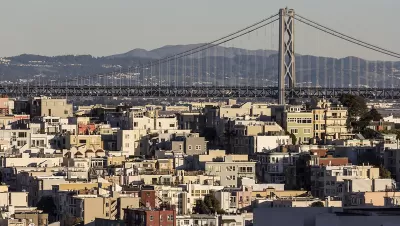The tech industry has created massive wealth, and the impacts on the real estate market are most dramatic in San Francisco.

Alexis C. Madrigal reports on the influence of money from the technology sector on San Francisco’s already tight and astronomically expensive real estate market. Deniz Kahramaner, a data scientist working in real estate, used title-company data to gather information about homebuyers and found that much of the money came from the tech industry, says Madrigal:
Fully 51 percent of them worked in software. They bought in specific, desirable neighborhoods closer to San Francisco’s tech companies, as well as the highways and train lines that lead south into Silicon Valley. They were less likely to buy in the foggy Sunset, which is the worst commute to tech businesses.
A number of IPOs are on the horizon, and the San Francisco housing market could see major impacts from the flood of big money. "[Kahramaner] foresees 3,885 new buyers looking for houses less than $3 million, in a market in which fewer than 6,000 homes total sell per year. At the top end, it gets even crazier—with more than 1,000 buyers looking from $3 million on up," writes Madrigal.
The San Francisco trend of wealth—what Madrigal calls "globally derived, locally applied"—is not unusual today. "But nowhere matches this city’s collision of the dematerialized economies of finance and technology with land, the need for shelter, the concept of home, and a place that so many loved when they could afford to live there."
FULL STORY: Who’s Really Buying Property in San Francisco?

Alabama: Trump Terminates Settlements for Black Communities Harmed By Raw Sewage
Trump deemed the landmark civil rights agreement “illegal DEI and environmental justice policy.”

Study: Maui’s Plan to Convert Vacation Rentals to Long-Term Housing Could Cause Nearly $1 Billion Economic Loss
The plan would reduce visitor accommodation by 25% resulting in 1,900 jobs lost.

Planetizen Federal Action Tracker
A weekly monitor of how Trump’s orders and actions are impacting planners and planning in America.

Wind Energy on the Rise Despite Federal Policy Reversal
The Trump administration is revoking federal support for renewable energy, but demand for new projects continues unabated.

Passengers Flock to Caltrain After Electrification
The new electric trains are running faster and more reliably, leading to strong ridership growth on the Bay Area rail system.

Texas Churches Rally Behind ‘Yes in God’s Back Yard’ Legislation
Religious leaders want the state to reduce zoning regulations to streamline leasing church-owned land to housing developers.
Urban Design for Planners 1: Software Tools
This six-course series explores essential urban design concepts using open source software and equips planners with the tools they need to participate fully in the urban design process.
Planning for Universal Design
Learn the tools for implementing Universal Design in planning regulations.
Caltrans
Smith Gee Studio
Institute for Housing and Urban Development Studies (IHS)
City of Grandview
Harvard GSD Executive Education
Toledo-Lucas County Plan Commissions
Salt Lake City
NYU Wagner Graduate School of Public Service





























